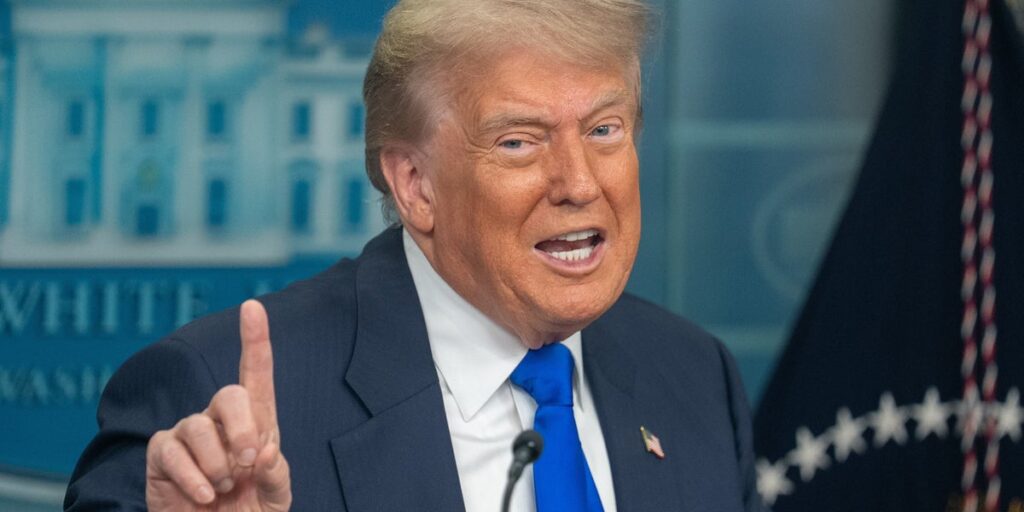
President Donald Trump on Monday intensified his criticism of Federal Reserve Chair Jerome Powell, urging a significant cut in interest rates. Using his signature style, Trump conveyed his message through a Sharpie-scrawled note, prominently displayed during a White House briefing.
Trump’s note, which featured a printed list of central bank rates from 44 countries, highlighted Switzerland at the top with a rate of 0.25%, while the United States, along with nine other nations, was at the bottom with a rate of 4.5%. Next to the list, Trump wrote, “Should be here,” with an arrow pointing towards the top, indicating his desire for lower rates.
In a direct message to Powell, Trump wrote, “Jerome ― You are, as usual, ‘too late.’ You have cost the USA a fortune ― and continue to do so ― you should lower the rate ― by a lot!” He further claimed, “Hundreds of billions of dollars being lost! No inflation!” White House press secretary Karoline Leavitt presented the note during a Monday briefing, further amplifying the president’s stance.
Trump’s Call for Action
In a Truth Social post accompanying an image of the note, Trump criticized Powell and the Federal Reserve Board, stating they “should be ashamed of themselves.” He called for a drastic reduction to a 1% interest rate, a move he believes would stimulate economic growth.
This development follows Trump’s previous threats to dismiss Powell, despite lacking the authority to do so. Reports suggest that Trump is considering appointing a replacement for Powell as early as this summer, potentially establishing a “shadow chair” well ahead of the official transition.
Reactions and Criticisms
Trump’s Sharpie-scrawled note quickly became a focal point for both supporters and critics. The president’s unconventional communication style, often involving handwritten notes and social media posts, has frequently drawn public attention.
Critics argue that Trump’s approach undermines the independence of the Federal Reserve, a cornerstone of U.S. economic policy. The Fed’s decisions on interest rates are typically made with careful consideration of various economic indicators, including inflation and employment rates.
“The Federal Reserve’s independence is crucial for maintaining economic stability,” said Dr. Emily Carter, an economist at the Brookings Institution. “Political interference can lead to short-term gains but may have detrimental long-term consequences.”
Historical Context and Expert Opinions
The tension between the White House and the Federal Reserve is not unprecedented. Historically, presidents have occasionally clashed with Fed chairs over monetary policy. However, Trump’s public and personal attacks on Powell are notably more direct and frequent than those of his predecessors.
According to Dr. Robert Johnson, a professor of finance at the University of Virginia, “Presidential pressure on the Fed has occurred before, but the manner and frequency of Trump’s criticisms are unusual. It raises questions about the potential impact on market confidence and the Fed’s ability to operate independently.”
Implications and Future Developments
The ongoing friction between Trump and Powell could have significant implications for the U.S. economy. While lower interest rates can stimulate borrowing and investment, they can also lead to inflation if not managed carefully. The Fed’s cautious approach aims to balance these factors, ensuring sustainable economic growth.
Looking ahead, the possibility of Trump appointing a new Fed chair could signal a shift in U.S. monetary policy. Such a change might align the Fed more closely with Trump’s economic priorities, potentially leading to more aggressive rate cuts.
As the situation evolves, the financial markets and global economic observers will be closely monitoring the interactions between the White House and the Federal Reserve, assessing the potential impacts on both the U.S. and international economies.







